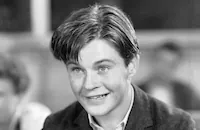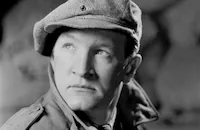Three Cornered Moon

Brief Synopsis
Cast & Crew
Elliott Nugent
Claudette Colbert
Richard Arlen
Mary Boland
Lyda Roberti
Wallace Ford
Film Details
Technical Specs

Synopsis
Brooklynite Nellie Rimplegar has been sustaining her family on stock investments made in the Three-Cornered Moon mine since her husband died. The family has been living as if they were wealthy, but when the money runs out, they are forced to find work. Daughter Elizabeth takes over managing the finances and gets a job at a shoe factory. Her brother Ed finds work as a lifeguard, while Douglas obtains an acting job, and Kenneth continues his work as a law clerk, in hopes that he will pass the bar exam and be promoted. In the meantime, Elizabeth's boyfriend Ronald, a writer whose head is in the clouds, moves in with them, but contributes nothing to the household, while Dr. Alan Stevens, who is a friend of the family and is in love with Elizabeth, moves in and pays rent. When Alan proposes a job with a publisher for Ronald, the family encourages Ronald to interview for the job, even though he is against working. On his way to the interview, Ronald is commandeered by Kitty, Kenneth's former fiancée who dumped him because he needed to work rather than attend a party with her. While Ronald is gone, Ed passes out from malnutrition and overwork, but revives. Ronald returns having missed his interview, so that he could think about chapter four of his novel, and Elizabeth finally recognizes his weakness. Kenneth passes the bar, and after Ronald makes an appearance with Kitty, with whom he has moved in, Elizabeth realizes she has loved Alan all along, and they decide to marry.

Director

Elliott Nugent
Cast

Claudette Colbert

Richard Arlen

Mary Boland

Lyda Roberti

Wallace Ford

Tom Brown
William Bakewell

Hardie Albright

Joan Marsh

Sam Hardy
Clara Blandick
Sam Godfrey
Edward Gargan
Nick Thompson
John M. Sullivan
Fred Santley
Jack Clark
Margaret Armstrong
Charlotte Merriam

Joseph Sauers
Jack Clark
John Kelly

Leonid Kinsky
George Le Guere
Crew
V. Bratton
Milton Bridenbecker
Fritz Collings
Earl Crowley
Farciot Edouart
Karl Gotham
Ray Harris
Earl Hayman
Gordon Jennings
S. K. Lauren
Jane Loring
Fred Mayer
Mirra Rayo
B. P. Schulberg
Harold Schwartz
Leon Shamroy

Videos
Movie Clip



Film Details
Technical Specs

Articles
Three Cornered Moon
Boland received top billing as Nellie Rimplegar, the fluttery matriarch of an upper-middle-class family who had benefitted financially from the stock market during the 1920s. Her overindulged children have lived a life of luxury without responsibility, turning them into spoiled adults. Colbert costars as her foolish daughter Elizabeth, who is in love with Ronald, a self-absorbed writer with an overly sensitive artistic temperament. The Rimplegar sons are no better: Wallace Ford plays Kenneth, a law clerk who neglects his studies to chase after his flighty, flirty girlfriend, William Bakewell is Douglas, an aspiring actor who endlessly rehearses his lines, and Tom Brown plays Eddie, the Harvard college student more interested in good times than good grades. Naïve and foolish, Mrs. Rimplegar is ill-equipped to manage the family's investments, and in due time, their fortune is wiped out. Elizabeth and her brothers learn the realities of life in the Depression when they struggle to keep and find jobs while they live hand to mouth.
Three-Cornered Moon includes scenes and events that Depression-weary audiences would find all too familiar. Though the film is a comedy, a few scenes are depicted in a serious, even poignant tone. A montage of Elizabeth's feet pounding the pavement as she looks for a job is accompanied by overlapping dialogue of anonymous despairing voices remarking on the scarcity of jobs and the consequences of not finding one. Elizabeth finally lands a job in a shoe factory thanks to another girl who tells her what to say in her interview. However, the job becomes impossible after the married foreman makes it clear that Elizabeth can only keep her job if she sleeps with him--a very real hazard for working girls during the Depression. Ken and Eddie skip meals in order to save money until Eddie faints from hunger, while Mrs. Rimplegar agrees to take in the family doctor, Alan Stevens, as a boarder.
As a wealthy family whose members are eccentric, spoiled, or out of touch with reality, the Rimplegars represent a widespread convention in Depression-era comedies. From Bringing Up Baby (1938) to My Man Godfrey (1936) to You Can't Take It with You (1938), the rich were often depicted as peculiar, impractical, shallow, self-centered, insensitive, or capricious. Unsympathetic representations of the wealthy reflect the antipathy toward the upper crust during America's worst economic crisis in history. Or, the rich in the movies lack the common sense, practicality, and ingenuity that down-to-earth ordinary folk exhibit in order to survive, suggesting that everyday Americans have virtues that the wealthy don't. In Three-Cornered Moon, the Rimplegars' spoiled behavior is contrasted with pragmatic Dr. Stevens, played by Richard Arlen, who helps the newly poor family face their new circumstances. Dr. Stevens is not only a character the audience can relate to, but his "normal" viewpoint points out just how far removed from reality the Rimplegars are.
Claudette Colbert made her sound-film debut in 1929 before moving to Hollywood in 1931. After appearing in Ernst Lubitsch's The Smiling Lieutenant (1931) and Cecil B. DeMille's The Sign of the Cross (1932), she was fast becoming a major star when she was cast in Three-Cornered Moon in 1933. Her role as Elizabeth, the dreamy rich girl out of touch with the realities of the Depression, prefigures her star-making turn as spoiled Ellie Andrews in It Happened One Night (1934). By 1938, Colbert was such a successful film star that she became the sixth top money-making woman in America.
The decade of the 1930s also belonged to Colbert's costar, Mary Boland, whose Nellie Rimplegar epitomized her cinematic star image as the fluttery wealthy dowager. Her characters tended to be pretentious society matrons or zany matriarchs, which suited the era's penchant for stories of eccentric wealthy families. In retrospect, Boland seems to have been largely forgotten compared to Spring Byington and Billie Burke, who played similar characters.
Marie Anne Boland, the daughter of actor William A. Boland, was born into a family of performers in 1885. She was educated in a Detroit convent before making her theatrical debut at age 15 in a touring company of A Social Highwayman. Boland honed her craft in stock companies until 1905, when she appeared on Broadway in Strongheart. A striking blonde, she grew into leading lady roles under the supervision of a prominent producer, Charles Frohman, whose successful career was cut short when he died in the sinking of the RMS Lusitania. By that time, Boland had become a prominent stage actress, costarring opposite such leading men as John Drew, Jr. in major productions of Jack Straw, Inconstant George, Smith, and Much Ado About Nothing. At the height of her stage career, she made her screen debut in the silent film The Edge of the Abyss in 1915. While she appeared occasionally in silent films, the stage dominated her life at this time.
In 1919, Boland starred as the stepmother in Clarence, marking her first role as a scatterbrain and a transition in her career. The character type eventually became her forte, and the role brought out her talent for comedy. In the early 1930s, Boland was over 40 years old, but her career was still in high gear. In 1931, she marked her first radio performance when she appeared on the A & P Bandwagon, hosted by Kate Smith. The following year, she costarred in the hit Broadway musical Face the Music for 166 performances. Around this time, Hollywood studios were raiding Broadway stage productions for actors adept at handling dialogue for talking films. Boland signed with Paramount in 1931, embarking on a new phase to her long career.
The veteran actress made her talking-film debut in Secrets of a Secretary, which starred Claudette Colbert. Two years later, the two reteamed for Three-Cornered Moon, with Boland receiving billing over Colbert in the opening credits. Decades of stage experience had served Boland well, as the film reveals her exquisite timing with comic dialogue and her finesse with movement and gestures. In the opening scene, Nellie glides into the kitchen in a delicate feathered robe that her children had given her as a present. The fancy robe is out of place in the kitchen, which is made obvious because Boland gently fluffs the feathers to draw the audience's attention to the elaborate sleeves and neckline. When a delivery man tells Nellie that he needs another 30 cents, she walks from room to room to ask her children for the money, which is a device to introduce viewers to the characters. In her daughter's room, Nellie finds a despondent Elizabeth moping over the meaning of her life, prompting her chatty mother to proclaim, "It's that cheese you ate last night" in a perfect cadence to draw a laugh.
Boland's character may seem too dizzy for modern audiences because she is not treated with respect by her children, especially after they learn she is responsible for their financial disaster. Unlike the other characters, Nellie has no serious scenes to reveal another side to her foolish nature. She remains little more than the butt of jokes, especially on the part of her sons, because she can never do anything right, whether it is cooking a meal or attending to an ill child. It is to Boland's credit that the character exhibits enough warmth and charm for audiences to sympathize with her.
During her Hollywood career, Boland appeared in over 40 films, including a series of comedies opposite Charles Ruggles beginning with Ruggles of Red Gap (1935). While her primary focus was the movies, she occasionally returned to the stage, including the 1935 hit musical Jubilee. Her last Broadway appearance was as the domineering mother in Lullaby in 1954. By that time, Boland had moved into another medium, live television. She died in 1965, having conquered theater, radio, film, and television.
Producer: B.P. Schulberg
Director: Elliott Nugent
Screenplay: Ray Harris and S.K. Lauren from the play by Gertrude Tonkonogy Cinematography: Leon Shamroy
Editor: Jane Loring
Costume Designer: Travis Banton
Music: John Leipold
Cast: Nellie Rimplegar (Mary Boland), Elizabeth Rimplegar (Claudette Colbert), Dr. Alan Stevens (Richard Arlen), Kenneth Rimplegar (Wallace Ford), Jenny (Lyda Roberti), Eddie Rimplegar (Tom Brown), Kitty (Joan Marsh), Ronald (Hardie Albright), Douglas Rimplegar (William Bakewell), Hawkins (Sam Hardy).
BW-77m.
by Susan Doll

Three Cornered Moon
Quotes
Trivia
Notes
According to Hollywood Reporter news items and an early script in the Paramount story files at the AMPAS library, Jack Oakie was originally slated to play "Kenneth," but was replaced by Wallace Ford. Hollywood Reporter also noted that Alison Skipworth was originally slated for a lead role.














